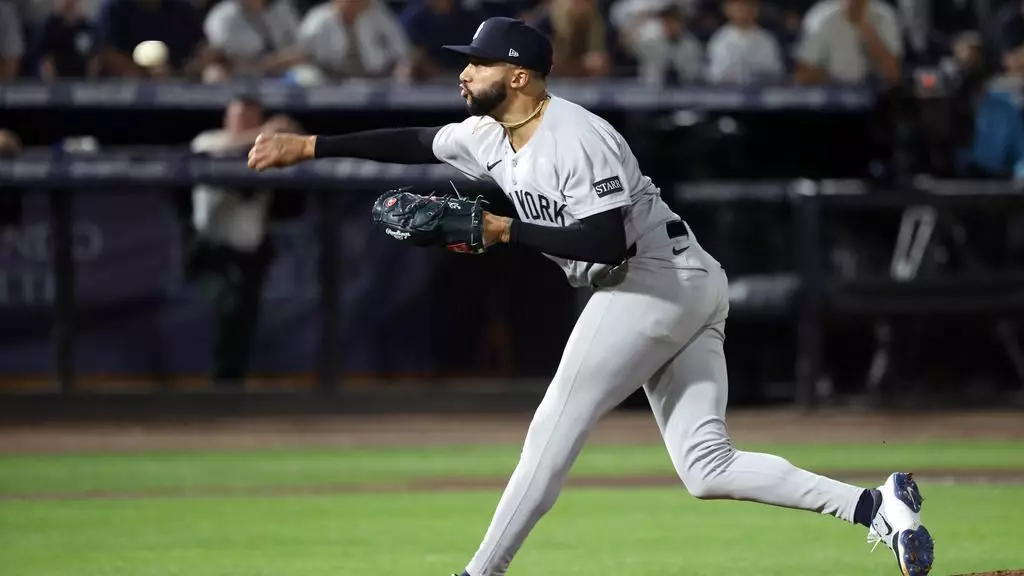In the world of professional sports, the transition from one team to another can be a double-edged sword. Devin Williams, recently acquired by the New York Yankees after a stellar tenure with the Milwaukee Brewers, embodies this precariousness. Just weeks into his Yankees career, he finds himself grappling with inconsistency that starkly contrasts his previous All-Star stature. The situation reached a boiling point when the Tampa Bay Rays capitalized on Williams’ struggles, overwhelming him and sealing a devastating 10-8 victory over New York—a match that snapped the Yankees’ five-game winning streak.
The pressure is palpable as Williams moves in and out of the spotlight, but it’s essential to consider the impact of such high expectations and the psychological burden they impose on an athlete. He arrived with the promise of dominance, sporting an impressive record with the Brewers. However, now with a 9.00 ERA, he appears to be battling both internal demons and external scrutiny, a phenomenon that can derail even the most talented players.
Analyzing Performance: Room for Improvement
Statistics reveal a troubling narrative: Williams has allowed runs in four of his nine appearances, and with an uncharacteristic 333 average against him, opponents are finding ways to exploit his vulnerabilities. Beyond the numbers, the subtleties of his mechanics are worth dissecting. Observers note the dissonance between his potent capabilities and the ultimate execution on the mound. Williams himself critiques his performance, acknowledging both good and bad pitches during games, yet struggling to harness the consistency required at the Major League level.
His admission about walking seven batters in eight innings stands out, highlighting a concerning trend of control issues. These struggles raise questions about his mental state, particularly following his delayed start to the season due to injuries sustained during spring training. The stress fractures he faced might be influencing his approach, both physically and psychologically, causing a ripple effect on his performance.
Opportunities on the Horizon
While Williams navigates these challenges, it’s crucial to note that the door is not closed for redemption. Yankees manager Aaron Boone’s comments underline the confidence that remains in Williams’ potential, framing his current slump as an obstacle he possesses the tools to overcome. Yet, the emergence of Luke Weaver as a viable alternative for the closer role looms large. Weaver’s impeccable track record—boasting no runs in 11 innings over nine games—cast a spotlight on performance and resilience, suggesting a fierce competition for the role.
This competition can serve as both a motivator and a detractor for Williams. On one hand, the presence of success breeds urgency; on the other, it could amplify anxiety as he strives to reclaim his form. Balancing the dual-edged sword of competition is pivotal in a team environment, especially when wins rely on precise execution.
Understanding the Pitching Mechanics
Digging deeper into Williams’ mechanics sheds light on potential corrective measures. His changeup—a previously instigated weapon—seems to have lost its effectiveness, generating a mere one swing-and-miss out of seven attempts. Williams himself speculates on the over-reliance on the pitch, suggesting a need for diversification in his arsenal. In high-pressure scenarios, this reliance can render even the finest players vulnerable to predictable outcomes.
Furthermore, Boone’s remarks point to “a lot of soft contact,” evidence that Williams’ pitches may not effectively disrupt the timing of hitters. As Williams acknowledges the need to refine his repertoire, there is a thin line between assertive pitches and overthinking in real-time scenarios, often reflecting the complexities of a pitcher’s psyche in the heat of battle.
The Road Ahead: A Turning Point?
While Williams grapples with adversity, this juncture in his career may serve as a pivotal moment, presenting the opportunity for growth and determination. The combined influence of supportive management, competitive peers, and self-assessment creates an environment ripe for transformation. Regardless of past performances, the essence of sports lies in resilience and the drive to evolve. As Williams continues to adjust, the baseball world watches closely, hoping to witness the resurgence of a player who once captivated fans with his electric pitches. The true test of his mental fortitude lies ahead, and it will be fascinating to see if he can recapture the magic that once made him a celebrated closer.


Leave a Reply